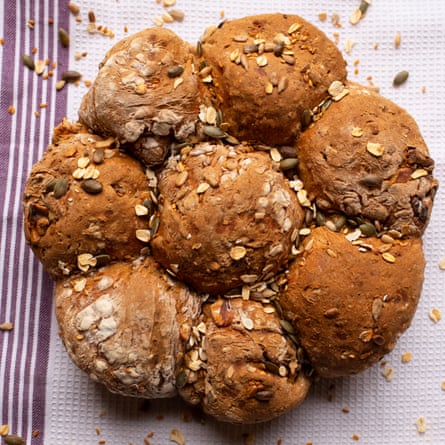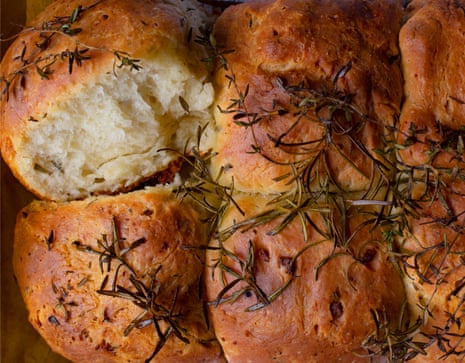Thick chunks of bread, textured and chewy, have been cut from a vast loaf and are on their way to our table. There’s a little dish of butter on the side, as pale and soft as Mr Whippy, that will soon be speckled with the loaf’s blackened crust. A fine loaf is a good start to any dinner, but I have to admit to missing the wicker basket of rolls that used to accompany a meal in a restaurant. The plump little bubbles of dough that appeared, peeping at us from under their snow-white linen napkin. I loved digging in with my thumbs and tearing my chosen roll apart, buttering each ripped morsel in turn. And although it was rarely the best of bread, it was nevertheless all mine. A whole, fat little cherub of dough all to myself.
I can’t remember the last time I was offered a bread roll in a restaurant, so this week I made my own. Two actually. One, a dark, oat-flecked rye-flour version. The other, soft and slightly oily to the touch, like focaccia, but with nuggets of sheep’s cheese.
We ate the brown rolls with fillets of smoked trout and mayonnaise that was vivid green with chopped dill and parsley. The soft rolls were split and filled with crisp-fleshed winter tomatoes dressed with a mustardy olive oil and curly Turkish pickled chillies. Those we didn’t eat on the day we toasted, dipping each one into olive oil and then into a powder of crushed toasted hazelnuts, sesame, paprika and ground coriander seeds.
Soft rolls with feta and kefir
These rolls prove more slowly than usual because of the cold kefir. Speed things up by using a warm bowl and by warming the flour in the oven for a few minutes before adding the yeast and liquid.
You will also need a rectangular baking dish or bread tin, approximately 25 x 16cm. Makes 6 rolls
plain flour 500g
fast-acting yeast 1½ tsp
sea salt ½ tsp
kefir 200ml
olive oil 3 tbsp
warm water 100ml
feta cheese 200g
rosemary 3 bushy sprigs
thyme 5 bushy sprigs
To finish:
olive oil a little
thyme and rosemary a few sprigs
Put the flour, yeast and salt in a large, warm mixing bowl. Put the kefir in a jug, add the olive oil and the warm water and stir well. Combine the kefir mixture and flour with a wooden spoon or your hands and mix until you have a soft and slightly sticky dough.
Crumble the feta into a small bowl. Remove the leaves from the rosemary and thyme and finely chop them to give you 1½ tbsp, and add to the crumbled cheese.
If you are making the dough by hand, tip on to a floured board and knead the cheese and herbs into it. If you prefer the easy way, use a food mixer fitted with a dough hook to knead the cheese and herbs into the dough. Continue kneading for a couple of minutes, adding a little more flour if necessary to stop it sticking, then put the dough back in its bowl, cover with a clean, warm cloth and put it in a warm place. Leave the dough in peace until it has risen to almost twice its original size.
Line a deep-sided baking tin with a piece of baking parchment.
Cut the dough into 6 equal pieces then shape each one into a round bun. Place the buns in the baking tin, three down each side, then return to the warm place, cover with the cloth and leave for about 30 minutes, until nicely risen and touching one another.
Set the oven at 220C/gas mark 8. Toss the herbs in the olive oil and scatter them over the rolls then bake for about 20 minutes, until lightly golden brown.
Treacle, rye and walnut rolls

The dark and faintly liquorice note here makes these rolls a perfect match for smoked fish. For once, I suggest salted butter.
Makes 8 rolls
rye flour 100g
strong white bread flour 300g
dried yeast 1½ tsp
sea salt 1 tsp
hot water 350ml
black treacle 2 tbsp
sunflower seeds 35g
pumpkin seeds 50g
rolled oats 80g
linseed 35g
walnut 50g, chopped
Line the baking or cake tin with a piece of baking parchment.
Mix together the two flours, dried yeast and salt. Stir the hot water and black treacle together then combine with the flours, sunflower and pumpkin seeds and the rolled oats. When thoroughly combined, knead either by hand on a floured board or using an electric food mixer with a dough hook. The hand method will take about 6 minutes. Using a machine, just a couple of minutes on moderate speed.
Transfer the bowl to a warm place, cover with a clean cloth and leave for an hour or so, until the dough has almost doubled in size.
Remove the dough from the bowl and place on a lightly floured board. Add the chopped walnuts and lightly knead them into the dough. Cut the ball of dough into eight, then shape each into a ball. Place them, almost touching, in a round baking tin or cake tin about 22cm in diameter. Scatter the surface with a few oats and seeds and put in a warm place, covered by a clean cloth and leave until the rolls have risen and are touching one another.
Preheat the oven to 220C/gas mark 8. Put the rolls in the oven and bake for 25-30 minutes until the surface is crisp and they sound hollow when tapped. Turn out and leave to cool. (Though it has to be said they are delicious eaten warm.)
Follow Nigel on Twitter @NigelSlater
